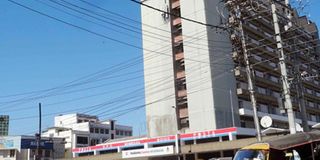Tough new law to ease complex tax procedures

Better service: The newly refurbished Huduma Centre at GPO Mombasa, on Digo Road, that is expected to be officially opened by President Kenyatta on August 28, 2014. Huduma centres and the new simplified tax law are part of the government’s ongoing efforts to improve service delivery. PHOTO | LABAN WALLOGA |
What you need to know:
- The new Tax Procedures Bill, 2014 also contains far-reaching propositions on defaulters.
- Currently, tax procedures are contained in each tax law.
A proposed law to harmonise tax procedures has been released as the government moves to ease compliance and increase revenues.
The new law also seek to authorise the use of mobile money to pay taxes, which is largely dominated by cash or bank transfers.
The new Tax Procedures Bill, 2014, which is aimed at making uniform the procedures across three tax legislations — Value Added Tax, Excise Duty and Income Tax — also contains far-reaching propositions on defaulters.
During the reading of the 2014/15 Budget in June, National Treasury Cabinet Secretary Henry Rotich said the Bill was aimed at making tax administration easier, while at the same time, reducing the cost of compliance.
Currently, tax procedures are contained in each tax law.
“The current world practice is to have all the procedures that are general and applicable to all the tax laws contained in one law,” Mr Rotich said during the Budget reading.
LEVY A PENALTY
In a move that could also affect the operation of informal enterprises, the taxman will levy a penalty of Sh100,000 a month on those entities or persons that fail to register for tax if they qualify.
The Bill proposes that taxes and tax returns may be filed using electronic or mobile payment platforms to ease payment.
The law also indicates that the authorised tax collection officers will have the same powers as those of the police in matters to do with tax administration.
The National Treasury also published the Excise Duty Bill 2013 intended to streamline legislation and administration of sin taxes.
GENERALISED COMMODITIES
The Bill, though not making any change on the applicable tax rates, expounds on previously generalised commodities as the government seeks clarity to reduce tax avoidance.
The current regime, for instance, provides for 20 per cent duty on an imported motor vehicle, but the Bill breaks the same into 13 categories for clarity.
Processed tobacco, on the other hand, attracts a 130 per cent duty currently, but the Bill to expand that to include reconstituted tobacco, water pipe tobacco, other manufactured tobacco and other smoking tobaccos.
Cheroots, Cigars and cigarillos also now fall under the processed tobacco category.
Mr Rotich did not announce any changes in excise duty on beer and cigarettes like his predecessors, but alluded to this impending amendments to the Excise Tax Act.






